

Media Claim Disastrous Higher Wind Speeds – After Claiming Lower Speeds. By Paul Homewood The Climate Clowns are exposed again!
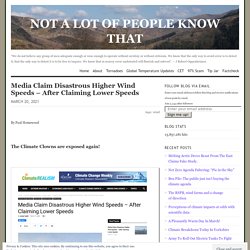
The Associated Press published – and the Appleton Post-Crescent (Wisconsin) republished today – an article claiming global warming is causing an acceleration of wind speeds with disastrous consequences for the Great Lakes. However, the article and its claims have little credibility, as the Associated Press previously claimed global warming (a.k.a. climate change) is causing wind speeds to slow down, not speed up. The Associated Press/Appleton Post-Crescent article is titled, “Scientists: climate-whipped winds pose Great Lakes hazards.” The article claims, “Powerful gusts linked to global warming are damaging water quality and creating a hazard for fish in Lake Erie and perhaps elsewhere in the Great Lakes, according to researchers.” According to the article, high winds bring water with low oxygen and high phosphorous from deep in the Great Lakes to the surface, “creating a hazard for fish and insects on which they feed.” Wildfires increase winter snowpack — but that isn’t necessarily a good thing.
Study shows important potential implications for watershed hydrology Deep in the Tushar mountains, some three hours south of Brigham Young University’s campus in Utah, Ph.D. student Jordan Maxwell and two other students found themselves in deep snow, both literally and figuratively.

It was December 2014 and the students had just started field work under the tutelage of BYU forest ecologist Sam St. Clair for research on the impact of wildfires on snowpack levels. Unfortunately, the snowmobiles they’d been using could go no further and there were still dozens of measurements they needed to take. “So, we put on our skis and got to work,” Maxwell said. Drive-by climate alarmism: Venezuela lightning. An iconic natural feature of Venezuela is Catatumbo lightning.
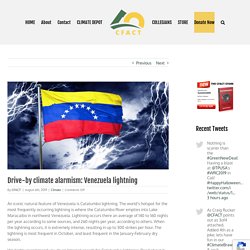
The world’s hotspot for the most frequently occurring lightning is where the Catatumbo River empties into Lake Maracaibo in northwest Venezuela. Lightning occurs there an average of 140 to 160 nights per year according to some sources, and 260 nights per year, according to others. Climate change makes summer weather stormier yet more stagnant. Study finds rising temperatures feed more energy to thunderstorms, less to general circulation.
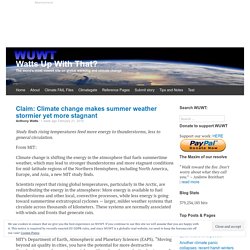
From MIT: Climate change is shifting the energy in the atmosphere that fuels summertime weather, which may lead to stronger thunderstorms and more stagnant conditions for mid-latitude regions of the Northern Hemisphere, including North America, Europe, and Asia, a new MIT study finds. Scientists report that rising global temperatures, particularly in the Arctic, are redistributing the energy in the atmosphere: More energy is available to fuel thunderstorms and other local, convective processes, while less energy is going toward summertime extratropical cyclones — larger, milder weather systems that circulate across thousands of kilometers.
These systems are normally associated with winds and fronts that generate rain. Upper-ocean warming is changing the global wave climate, making waves stronger. From EurekAlert!
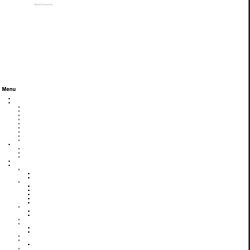
Public Release: 14-Jan-2019 Upper-ocean warming is changing the global wave climate, making waves stronger The energy in ocean waves has been increasing as a consequence of climate change, according to a new study University of California – Santa Cruz Increasing wave energy with climate change means more challenges for coastal risk and adaptation. Sea level rise puts coastal areas at the forefront of the impacts of climate change, but new research shows they face other climate-related threats as well.
Global warming causes colder winters and more snow in Europe. From the “with models, we can make anything believable” department.
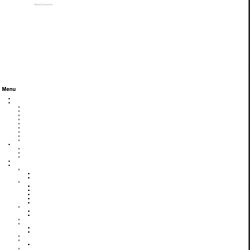
New paper argues for a stronger influence of Arctic sea-ice loss on recent Eurasian cooling, thus causing colder winters and more snow in Europe due to climate change. A reconciled estimate of the influence of Arctic sea-ice loss on recent Eurasian cooling. A Synthesis of Papers about the Madden-Julian Oscillation under Anthropogenic Warming. Global warming will make El Niño and La Niña event impacts worse. From the “tail wagging the dog and AGW affects everything, it’s omnipotent “department, they seem to forget that El Niño induced temperature events are significantly larger than the posited AGW signal itself.
Claim: “climate change” will affect your day at the lake. From the University of New Hampshire and the “best day fishing is still better than the best day worrying over climate change” department.
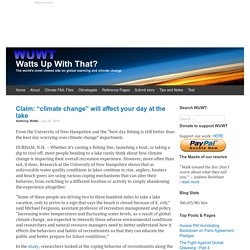
DURHAM, N.H. – Whether it’s casting a fishing line, launching a boat, or taking a dip to cool off, most people heading to a lake rarely think about how climate change is impacting their overall recreation experience. However, more often than not, it does. Research at the University of New Hampshire shows that as unfavorable water quality conditions in lakes continue to rise, anglers, boaters and beach goers are using various coping mechanisms that can alter their behavior, from switching to a different location or activity to simply abandoning the experience altogether.
“Some of these people are driving two to three hundred miles to take a lake vacation, only to arrive to a sign that says the beach is closed because of E. coli,” said Michael Ferguson, assistant professor of recreation management and policy. Claim: CO2 Causes Extreme Weather Even Without Global Warming. Guest essay by Eric Worrall A new study by Professor Myles Allen, David Karoly and others claims that even if CO2 does not cause significant global warming, we still have to cap CO2 to prevent a “direct CO2 effect” from messing up the weather.
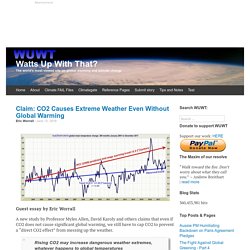
Rising CO2 may increase dangerous weather extremes, whatever happens to global temperaturesPress release issued: 11 June 2018New research from the University of Oxford and collaborators at several other institutions, including the University of Bristol, provides compelling evidence that meeting the global warming target of 1.5°C may not be enough to limit the damage caused by extreme weather.The paper, published today in Nature Climate Change, demonstrates that higher atmospheric CO2 concentrations directly increase temperature and rainfall extremes, meaning there could be dangerous changes in these extremes even if the global mean temperature rise remains within 1.5°C. Claim: British Isles getting "stormier" Claim: Ocean warming leads to stronger precipitation extremes. Claim: 'The Southern Ocean winds are now stronger than at any other time in the past 1,000 years,' CO2 blamed. Claim: More Frequent Less Intense Rainfall is Now a Problem. Claim: Climate change made Harvey rainfall 15 percent more intense.
Claim: Global Warming Causing More Icebergs. About the Claims That Northeast U.S. Blizzards Have Been Amplified by Human-Induced Global Warming. Claim: Glaciers melt faster than ever. This is the Rhone Glacier in June 2014.

CREDIT Simon Oberli From the UNIVERSITY OF ZURICH and the “lets ignore some of these other growing glaciers” department The World Glacier Monitoring Service, domiciled at the University of Zurich, has compiled worldwide data on glacier changes for more than 120 years. Together with its National Correspondents in more than 30 countries, the international service just published a new comprehensive analysis of global glacier changes in the Journal of Glaciology.
In this study, observations of the first decade of the 21st century (2001-2010) were compared to all available earlier data from in-situ, air-borne, and satellite-borne observations as well as to reconstructions from pictorial and written sources. Global glacier decline. Claim: Arctic warmth unprecedented in 44,000 years. Claim: Global Warming Creating Thicker Ice in the Baltic. Claim: Global warming makes frost damage worse. Claim: Climate change is 10x faster than ever before. From Stanford University comes this breathless missive that sounds just like every one we’ve heard before.

Claim: NOAA says the Arctic Ocean is becoming "corrosive"